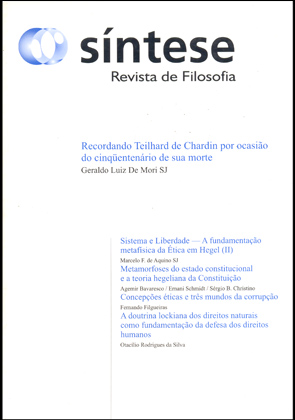METAMORFOSES DO ESTADO CONSTITUCIONAL E A TEORIA HEGELIANA DA CONSTITUIÇÃO
DOI:
https://doi.org/10.20911/21769389v32n104p335-370/2005Palavras-chave:
Constituição, Modelos constitucionais, Liberais e Comunitários, Filosofia do Direito, Mundialização.Resumo
Os Estados nas suas relações internacionais são levados a possuir uma estratégia de inserção mundial soberana. Daí a pergunta: Qual é a função da Constituição para inserir o Estado soberanamente na política internacional, buscando relações globais e plurais, em defesa dos interesses nacionais e da formação de um novo espaço político internacional de caráter democrático? Para responder a esta inquietação, analisamos a experiência histórica dos três modelos de Estado constitucional modernos: Liberal de Direito, Social de Direito e Democrático de Direito, expondo em seguida o debate contemporâneo entre liberais e comunitários e suas posições a respeito da Constituição. Face ao nosso problema temos duas posições. A resposta convencional promove o fortalecimento de blocos regionais e, portanto, a integração entre os países membros. A teoria hegeliana da Constituição, por seu lado, diante deste cenário da mundialização, prioriza os elementos da identidade constitucional como uma garantia e condição de reconhecimento mundial. O Estado, bem definido, constitucionalmente, poderá fazer uma inserção soberana e autônoma neste atual estágio de correlação de forças, tanto em nível regional, como mundial.
Abstract: All States, in their international relations, aim to adopt a sovereign strategy of global insertion. This leads to the following question: What is the role played by the Constitution in incorporating a sovereign State into international politics, when searching for global and plural relations aimed at defending national interest within a new international political context of a democratic type? To answer this query, we have analyzed the historical experience of three contemporary models of the constitutional State: Rule of Law, Social governance and Democratic governance. The contemporary debate opposing liberals to communitarians as well as their differing positions concerning the Constitution will also be exposed in this work. We are confronted with two standpoints. On the one hand, the conventional answer which promotes the strengthening of regional blocks and, therefore a better integration of member states and, on the other hand, the Hegelian Constitution theory which, in the face of globalization, prioritizes constitutional identity elements as a guarantee and condition of global recognition. A constitutionally well-defined State will have the capacity of incorporating itself, in a sovereign and autonomous way, into the current stage of correlation of forces, both nationally and globally.


















